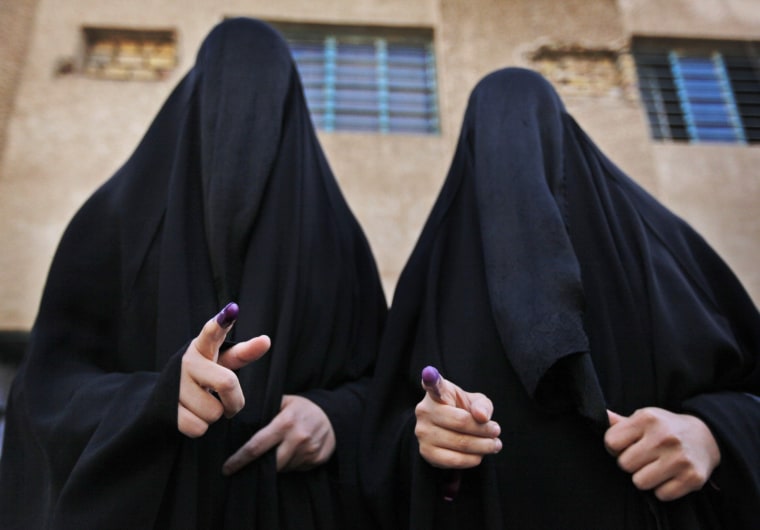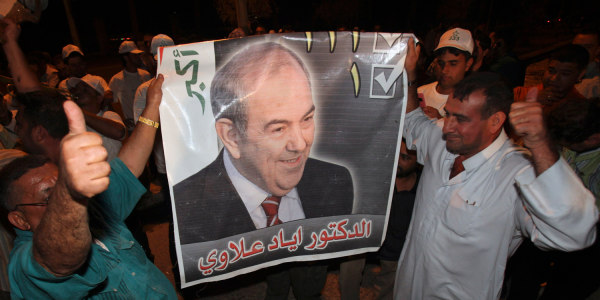Despite bombings, mortar rounds and grenades that claimed at least 36 lives, Iraqis voted Sunday in an election testing the mettle of the country's still-fragile democracy.
About 19 million Iraqis were eligible to vote for who will lead the country after U.S. forces pull out, in an election that will determine whether Iraq can overcome the jagged sectarian divisions that have defined it since the U.S.-led invasion in 2003.
In Washington, U.S. President Barack Obama praised Iraqis who took part in the historic vote. "By any measure this was an important milestone in Iraqi history," Obama said in brief comments from the White House. "In a strong turnout, millions of Iraqis exercised their right to vote with enthusiasm and optimism."
It could take three days to get results, U.N. officials say. And with the fractured nature of Iraqi politics, it could take months of negotiations after results are released in the coming days for a government to be formed.
Voters in the ethnically and religiously divided country were given a choice between secular groups and Shiite Islamist parties that have dominated Iraq since Saddam Hussein's fall.
Despite mortars raining down nearby, voters in the capital still came to the polls. In the predominantly Sunni neighborhood of Azamiyah in northern Baghdad, Walid Abid, a 40-year-old father of two, was speaking as mortars boomed several hundreds yards (meters) away. Police reported at least 20 mortar attacks in the neighborhood shortly after daybreak. Mortars also fell in the Green Zone — home to the U.S. Embassy and the prime minister's office.
"I am not scared and I am not going to stay put at home," said Abid, who owns a cafe. "Until when? We need to change things. If I stay home and not come to vote, Azamiyah will get worse."
Prime Minister Nuri al-Maliki, a Shiite, urged all parties to accept the results. "He who wins today may lose tomorrow, and he who loses today may win tomorrow," he said after casting his ballot in the fortified Green Zone enclave.
Some irregularities alleged
One of al-Maliki's opponents, ex-Prime Minister Iyad Allawi, has already complained of irregularities in early voting.
Allawi's secular list is tapping into exasperation with years of conflict, poor public services and corruption, and hopes to gain support from the once privileged Sunni minority.
The Islamic State of Iraq, an al-Qaida affiliate, had warned Iraqis not to vote and vowed to attack those who defied them.
At least 19 people died in northeastern Baghdad after an explosion leveled a building, and mortar attacks in western Baghdad killed seven people in two different neighborhoods, police and hospital officials said.
Slideshow 39 photos
Elections in Iraq
In Baghdad's northeast Hurriyah neighborhood, where mosque loudspeakers exhorted people to vote as "arrows to the enemies' chest," three people were killed when someone threw a hand grenade at a crowd heading to the polls, said police and hospital officials.
In the city of Mahmoudiya, about 20 miles south of Baghdad, a bomb inside a polling center killed a policeman, said Iraqi Army Col. Abdul Hussein. There were also explosions elsewhere in the country, but no further reports of fatalities.
Insurgents also launched mortars toward the Green Zone — home to the U.S. Embassy and the prime minister's office — and in the Sunni stronghold of Azamiyah police reported at least 20 mortar attacks in the neighborhood since daybreak.
About 6,200 candidates were competing for 325 seats in the new parliament, Iraq's second for a full term of parliament since the 2003 U.S.-led invasion seven years ago this month.
Many view the election as a crossroads at which Iraq will decide whether to adhere to politics along the Shiite, Sunni and Kurdish lines or move away from the ethnic and sectarian tensions that have emerged since the fall of Saddam's iron-fisted, Sunni minority rule.
Iraqis hope it will help them achieve national reconciliation at a time when the United States has vowed to withdraw combat forces by late summer and all American troops by the end of next year.
Al-Maliki is fighting for his political future against a coalition led by mainly Shiite religious groups — the Supreme Islamic Iraqi Council and a party headed by anti-American cleric Muqtada al-Sadr. He also faces a challenge from secular alliance led by Ayad Allawi, a former prime minister and secular Shiite, who has teamed up with a number of Sunnis in a bid to claim the government.
'Iraq's liberation'
Even Al-Sadr, speaking at a rare news conference in neighboring Iran, urged Iraqis to take part in the election to help pave the way for the country's "liberation" from U.S. forces.
Al-Sadr galvanized anti-U.S. sentiment following the 2003 invasion of Iraq but faded from the political scene since he vanished — ostensibly to embrace religious studies in Iran — more than two years ago.
Al-Sadr's Mehdi Army, once a feared militia, has largely laid down its arms but his political movement is trying to make a comeback.
"Although holding elections under the shadow of occupation does not have legitimacy, I ask the Iraqi people to take part in the election as a political resistance move so that the ground is prepared for occupiers to leave Iraq," Sadr said on Saturday evening, Iran's official IRNA news agency reported.
"I ask the Iraqi people to go to the polls to elect the best people who can prepare the ground for Iraq's liberation," he said.
Al-Sadr's movement is a key player in a Shi'ite-led coalition taking part in the national vote, and is likely to be influential in Iraq's next parliament, if not in government.
It has wide support, mostly among the Shiite poor in the oil-producing south and deprived urban areas such as Baghdad's Sadr City slum.
Security was tight across the capital. The borders have been sealed, the airport closed and hundreds of thousands of Iraqi military and police have flooded the streets.
Extra checkpoints were set up across the city, and in some parts of central Baghdad, people could not go 50 yards without hitting another checkpoint.
A ban on small vehicles was lifted around the country, except in northern Ninevah province, to facilitate access to the polls, Maj. Gen. Ayden Khalid Qader, who's in charge of election security, on state-run Iraqiya television.
But many voters continued to proceed to the polling places on foot.
In keeping with the U.S. military's assertion that Iraqis are running the elections, the only visible American military presence was in the air or escorting election observers to and from the polls; four U.S. helicopter gunships could be seen in the sky over the Kazimiyah neighborhood.
The U.S., which has lost more than 4,300 troops in the nearly seven-year conflict, has fewer than 100,000 troops in the country — a number that is expected to drop to about 50,000 by the end of the summer.
Purple-inked fingers
Exiting the polls, Iraqis waved purple-inked fingers — the now-iconic image synonymous with voting in this oil-rich country home to roughly 28 million people.
Despite the violence and frustration that has set in after years of fighting and faulty government services, many Iraqis were still excited to vote.
In the city of Nasiriyah, in the Shiite south, crowds of people filled the streets — men in what appeared to be their best clothes were accompanied by women in long black cloaks and often children.
"I voted in 2005. There were a lot less people then," said Ahmed Saad Chadian. "Today participation is much higher."
In the Shiite holy city of Najaf, south of Baghdad, dozens of voters also lined up to cast their ballot.
"We came to participate in this national day, and we don't care about the explosions," said Sahib Jabr, a 34-year-old old taxi driver.
In Sulaimaniya in Iraq's Kurdish north, Fatma Aziz remembered her late husband as she cast her vote.
"When I put the ballot paper in the box, my tears fell ... I am sure he watched me from the grave while I voted for the Kurdish people," she said. "My vote will heal my wounds from when the Iraqi army shot him dead in Saddam's time."

